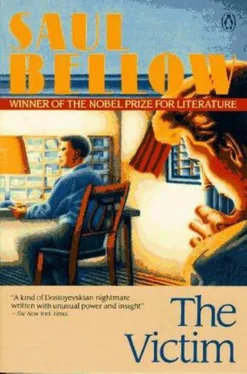Saul Bellow - The Victim
Здесь есть возможность читать онлайн «Saul Bellow - The Victim» весь текст электронной книги совершенно бесплатно (целиком полную версию без сокращений). В некоторых случаях можно слушать аудио, скачать через торрент в формате fb2 и присутствует краткое содержание. Год выпуска: 1988, Издательство: Penguin Books, Жанр: Современная проза, на английском языке. Описание произведения, (предисловие) а так же отзывы посетителей доступны на портале библиотеки ЛибКат.
- Название:The Victim
- Автор:
- Издательство:Penguin Books
- Жанр:
- Год:1988
- ISBN:нет данных
- Рейтинг книги:3 / 5. Голосов: 1
-
Избранное:Добавить в избранное
- Отзывы:
-
Ваша оценка:
- 60
- 1
- 2
- 3
- 4
- 5
The Victim: краткое содержание, описание и аннотация
Предлагаем к чтению аннотацию, описание, краткое содержание или предисловие (зависит от того, что написал сам автор книги «The Victim»). Если вы не нашли необходимую информацию о книге — напишите в комментариях, мы постараемся отыскать её.
The Victim — читать онлайн бесплатно полную книгу (весь текст) целиком
Ниже представлен текст книги, разбитый по страницам. Система сохранения места последней прочитанной страницы, позволяет с удобством читать онлайн бесплатно книгу «The Victim», без необходимости каждый раз заново искать на чём Вы остановились. Поставьте закладку, и сможете в любой момент перейти на страницу, на которой закончили чтение.
Интервал:
Закладка:
“Bravo!” said Harkavy.
“Amen and amen!” Shifcart laughed. He drew a card out of his wallet and threw it toward him. “Come and see me; I’ll fix you up with a test.”
The card fell near Leventhal, who seemed to be the only one to disapprove of the joke. Even Schlossberg himself smiled. The sunlight fell through the large window over their heads. It seemed to Leventhal that Shifcart, though he was laughing, looked at him with peculiar disfavor. Still he did not join in. He picked up the card. The others were rising.
“Don’t forget your hats, gentlemen,” called Harkavy.
The musical crash of the check machine filled their ears as they waited their turn at the cashier’s dazzling cage.
11
“I SAW Williston last night,” Leventhal mentioned to Harkavy outside.
“How is Stan? Oh, yes, about that thing you were telling me.” Harkavy would perhaps have said more, but the others were waiting for him. “Say, one of these days let me know how you’re making out with it, will you?”
“Sure,” Leventhal said. And Harkavy loitered off eastward on Fourteenth Street with Goldstone and his friends. He was the tallest among them. His yellow hair drifted flimsily, silkily over his bald spot. Leventhal watched him go. He would not admit to himself that he felt deserted. “Maybe it’s a good thing he isn’t interested,” he thought. “I don’t know if I could explain it anyhow. It’s getting too complicated. And he’d give me all kinds of useless advice — the usual. Anyhow I’m glad. I don’t think I really wanted to talk about it.” He remained aimlessly in the same place for a while and then walked off, pressing the bulky Sunday paper under his arm. He did not have a conscious destination and was distantly under the dread of being the only person in the city without one.
In the next block he remembered that he had neglected to call Elena to make sure Philip had gotten home safely and to ask about Mickey. He stopped at a cigar store and dialed Villani’s number. He sat in the booth, one leg stretched out of the door. No one answered. Leaning out, he looked at the clock cut squarely into the patterned tin of the wall. It was half-past two, and Elena had probably left to visit Mickey. He phoned the hospital, though he understood well enough that the information given about patients wasn’t reliable. He heard that Mickey was doing nicely, which was what he had expected to hear. There were upward of three thousand beds in the hospital. How could the girls at the switchboard be expected to know anything but the bare facts about each patient — whether he was alive or dead, that is? The word “dead,” dissociated from what he had thought, accompanied him ominously out of the store, and he made haste to get rid of it, simultaneously realizing, in another part of his mind, how superstitious he was becoming. All he had meant was that the hospital was too vast, and suddenly he had to erase an incidental word. Why, everyone born was sick at one time or another. Nobody grew up without sickness. He had had pneumonia himself and an ear infection, and Max had been down, too — he couldn’t recall with what.
He began to wonder how long Max was going to put off coming home. “Maybe he’s afraid of being tricked into returning,” he thought. “I’ll have a thing or two to say to him when I see him. For once in our lives. It’s time somebody called him down. Elena won’t, so he’s used to doing whatever he wants.” And what would Max have to say for himself? Something simple minded and foolish, he was certain. Because he was foolish. Philip already had more common sense than his father. Leventhal visualized his brother’s strongly excited face and imagined his incoherencies. “He sends them money and that makes him a father. That’s the end of his responsibilities. That’s fatherhood,” he repeated to himself. “That’s his idea of duty.”
From the dark staircase and hall, he entered the brilliantly sunlit front room. He sat on the edge of the bed and pushed off his shoes. The sheets were warm to his touch. The heavy folds of the curtain, the brown door, the fine red flowers in the carpet slowly consumed into a light smoke of dust, gave him a feeling of suspension and quietness. There was a long spider’s thread on the screen, quivering red, blue, and deeper blue against the wires like the last pliant, changeable thing in the stiffening, fixative heat. With one stockinged foot set on the other, his shoulders drooping, Leventhal sat watching, his face somnolent, his hands looking as if it would require a great effort to unclasp them.
Presently he went into the kitchen. He absent-mindedly rinsed a few dishes under the rumbling tap and, returning to the front room, unbuckled his belt, drew the curtains, and, with the Sunday paper unheeded under his legs, went to sleep.
A deep rolling noise awakened him. He thought at first that it came from below, out of the subway. But there was no accompanying tremor through the building. He soon placed the sound outside and above him. It was thunder. He looked out. There had been a storm. The screen was still clogged with raindrops. The street was softly darkened by the clouds and the wet brownstone. In one of the rooms across the way a two-branched green lamp was shining. A woman lay on a sofa, one arm bent over her eyes. At the next sound of the retreating thunder she moved her legs.
Leventhal glanced again into the mist and water of the street and then went to the phone and tried Villani’s number. There was still no answer. Apparently they were out somewhere, making a day of it. He poised the receiver over the hook, aimed it, and let it fall into place.
He worked his feet into his shoes, treading down the heels, and went down to the restaurant for an early dinner. The waiter, the same bald, lean man who last week had anticipated his protest about the bad table with a gesture of insincere helplessness, appeared to be occupied with thoughts of his own. His black suit looked damp, and his leather bow tie was not fastened but hung on its elastic from a buttonhole. He brought Leventhal a veal cutlet and a bottle of beer and hurried away with a muscular swing, softly — his soles were padded with sawdust — to wait on a long table of boccie players whose game had been rained out and who were drinking wine and coffee. The odor of wet wood was very noticeable. Leventhal did not linger over his meal. He was soon outside again. The air was dimmer than before, and hotter. He turned west on Eighteenth Street and saw Allbee waiting for him on the corner. He had to look twice in the wavering, longitudinal grays and shadows of the watery street to identify him.
Leventhal did not halt until Allbee detained him, stepping in his way. He dropped his head diffidently and clumsily, as though asking Leventhal to understand that he was compelled to do this.
“Well?” Leventhal said after a moment’s silence.
“Why didn’t you stop? You saw me…”
“And if I did? I’m not looking for you. You’re the one. You follow me around.”
“You’re mad about yesterday, aren’t you? That was a coincidence.”
“Oh, it was for sure.”
“I wanted to talk to you yesterday, it so happens. You won’t hunt me up. If I want to talk to you, I have to find opportunities.”
“Is that the way you describe it?”
“But when I remembered it was Saturday-you people don’t do business on Saturday — I postponed it.” The saying of this appeared to delight him. But then his expression changed. He seemed to recognize and even to be depressed by the poorness of his joke. He looked somberly and earnestly at Leventhal, who understood that Allbee wanted him to know of the feelings that gave rise to it, and to know also that since those feelings were dire and powerful the joke dissembling them was actually a courtesy.
Читать дальшеИнтервал:
Закладка:
Похожие книги на «The Victim»
Представляем Вашему вниманию похожие книги на «The Victim» списком для выбора. Мы отобрали схожую по названию и смыслу литературу в надежде предоставить читателям больше вариантов отыскать новые, интересные, ещё непрочитанные произведения.
Обсуждение, отзывы о книге «The Victim» и просто собственные мнения читателей. Оставьте ваши комментарии, напишите, что Вы думаете о произведении, его смысле или главных героях. Укажите что конкретно понравилось, а что нет, и почему Вы так считаете.











